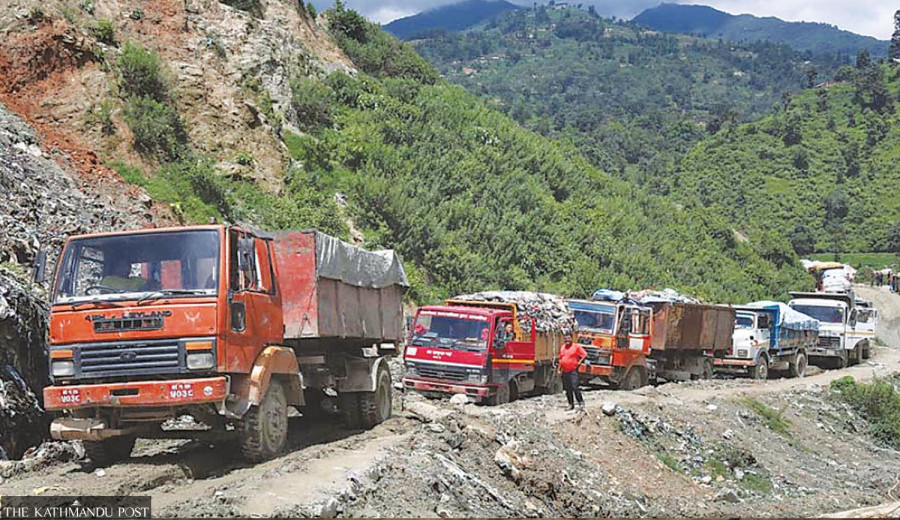National
Garbage disposal resumes after government pledges to address locals’ demands
Minister Ghising visited Bancharedanda landfill Sunday and promised to drop three-year-old vandalism cases against local youths within two weeks.
Post Report
Garbage disposal resumed at the Bancharedanda landfill on Sunday after Minister for Urban Development Kulman Ghising promised to withdraw cases filed against local youths charged with vandalism and address the remaining demands within two weeks.
Waste collection in the local units of the Kathmandu Valley and some parts of the Kavrepalanchok had stopped since Wednesday after the people living around the landfill on the Dhading-Nuwakot border obstructed disposal to press the government to fulfil past agreements.
“Garbage disposal at the landfill has resumed for now,” said Sarita Rai, chief of the Environment Department under the Kathmandu Metropolitan City. “Trucks that were stuck on the way to the landfill site since Wednesday have already unloaded their garbage, and other trucks are now on their way.”
Management of waste collected from local units of Kathmandu Valley and parts of Kavrepalanchok has been a recurring problem for years.
In the past, locals living around the landfill used to obstruct waste disposal to press their various demands related to better management of the waste at the landfill, employment for locals, and infrastructure development among other things.
But these protests had subsided after the incumbent mayor of Kathmandu Metropolitan City, Balendra Shah, promised to honour the past agreements reached with the protesters and address their new concerns following his election three years ago.
Agitating locals complained that they were forced to resort to protests and block garbage trucks after the Kathmandu metropolis and federal government turned a deaf ear to their demands.
They insisted that the withdrawal of cases against local youths was a precondition for further talks. About three years ago, the Kathmandu Metropolitan City filed a case against some locals for vandalising 18 garbage trucks.
“Minister Ghising has agreed to withdraw the case filed against some youths,” said Suman Tamang, chairman of Kakani Rural Municipality in Nuwakot. “They have also agreed to update us about other demands within two weeks.”
Among other demands, locals are pressing for the fulfillment of an 18-point agreement, which includes the acquisition of land affected by the landfill site. In the agreement, the government had promised to acquire a 1.5 km area around the landfill site by paying compensation to the owners.
The Ministry of Urban Development had earlier held discussions with the agitating locals, but they demanded that Minister Ghising visit the affected area first. On Sunday morning, Ghising reached the Bancharedanda landfill site and held talks with agitating youths.
“Minister Ghising has asked for 15 days to withdraw the case filed against local youths,” said Uddab Nepal, site in-charge of the Bancharedanda landfill site, appointed by the Kathmandu Metropolitan City. “The demand for land acquisition will be addressed as per the report of the environmental impact assessment committee, which is still working on the report.”
Companies that collect household waste had also suspended door-to-door collection since garbage disposal was halted. The city office had been dumping waste at its transfer stations, and officials feared waste would start piling up on the streets if no agreement was reached with the agitators.
Nepal, the landfill in-charge, said the garbage accumulated in the Valley would be cleared within the next few days.
Every day, over 200 garbage trucks dump waste collected from 18 local units of the Kathmandu Valley—Kathmandu Lalitpur and Bhaktapur district—and some areas of Kavrepalanchok district.
According to a rough estimate by the metropolis, the 18 local units in the Kathmandu Valley generate over 1,200 metric tons of solid waste daily. Of that, 50 percent is generated from the Kathmandu Metropolitan City alone.




 14.24°C Kathmandu
14.24°C Kathmandu














